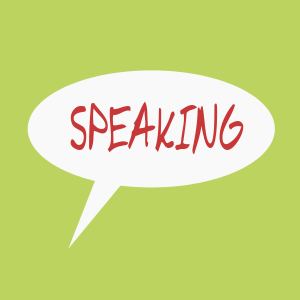
Speaking speed is one of the things most students feel nervous about at one stage or another. What is the right speaking speed? How do you get it? What do we talk about when we talk about speaking speed? I think I have all of your worries covered.
The Two Types Of Speed
There are two kinds of speaking speed that you can talk about: speed of production and speed of response.
Speed of production
This is how fast you actually get the words out. The average native speaker usually speaks at approximately three words per second but there are faster speakers and slower speakers, too.
If you don’t have to think very hard about what you need to say then your speed of production should be quite fast, in theory. However, students often have problems with speed of production because they take time over pronunciation, actually over-pronouncing by enunciating every letter that appears in every word and avoiding blending and linking. However, some students speak too fast because they worry too much about speed. If you are a second-language speaker and people have to ask you to slow down very often then maybe you need to relax a bit. Remember to breathe!
Speed of response
Speed of response is usually the more common problem, especially among intermediate speakers. A speed of response slower than a two-second pause without saying anything at all is very unnatural and needs to be worked on as a priority. Usually there are two root problems for this: not listening to natural English often enough or a lack of vocabulary or grammar which stops one expressing oneself.
How To Solve The Problems
Solving the problems might be easier than you might think but takes dedication. The main thing you need to do is to listen to as much English as possible. Television is your friend, and if you don’t have English television then you need to use YouTube or your local video shop.
Improving Speed of Production: Shadowing
You need to repeat along to as much English as you can. Watch television shows and repeat along to them. You should be thinking about pronunciation, too. How do the speakers on the television programme pronounce the words and link them together? These little tips will help you gain better fluency. It is a little difficult when you have fast speakers but you can try. Trying as hard as you can for five minutes is better than pretending your problem will get better by itself. Can you recite a one-minute conversation from a film or television programme you like? If you can, move on to a more difficult challenge.
Improving Speed of Response: Comprehension
First, you have to understand the people you are speaking to. Sometimes you need to be slow for a while to get used to people’s accents. Don’t be afraid to ask people to repeat themselves. Remember the reason you are speaking English is to communicate, not to be convenient to other people.
Developing Self-Expression: Getting the grammar and vocabulary
If you have problems expressing yourself you need to do the following things:
Keep a diary. Write the answers to the following questions:
- What was the conversation about?
- Did you know what you wanted to say?
- Were you scared to make mistakes?
- What ideas couldn’t you express?
Next, use your diary and the internet. Search for articles about the topic and you should be able to find new vocabulary about it. This vocabulary should match the ideas you couldn’t express. If not, maybe you are trying to translate something that does not translate between your first language and English very well.
Other than that, it might be grammar that is stopping you. It might be time to open the boring but useful English Grammar In Use. Take the test in the book first, find the grammar you have not mastered and work through it. Try to use the unknown grammar and vocabulary in your diary to write about the topic you couldn’t talk about confidently. Hopefully you’ll have better luck the next time.
